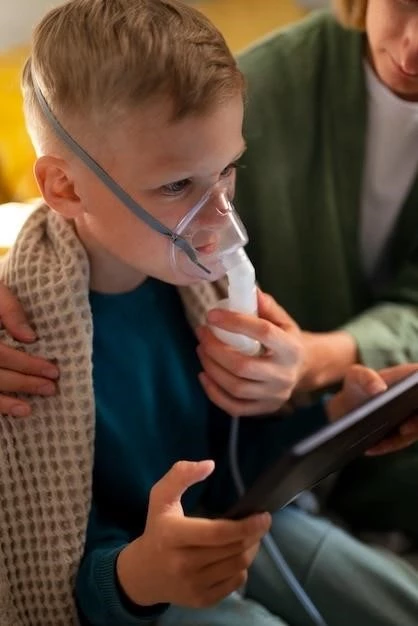Introduction to PFAPA Syndrome
Introduction. Periodic fever‚ aphthous stomatitis‚ pharyngitis‚ and adenitis (PFAPA) syndrome‚ first described in 1987‚ is the most common periodic fever condition in children. The episodes present recurrently with distinctive symptoms.
Description of the condition and its initial discovery
The Periodic Fever‚ Aphthous Stomatitis‚ Pharyngitis‚ and Adenitis (PFAPA) syndrome was first reported in 1987 by Marshall et al. It is an autoinflammatory disease characterized by recurrent episodes of fever‚ mouth ulcers‚ sore throat‚ and swollen neck glands. The syndrome typically onset before the age of 5 and episodes repeat every 3-8 weeks‚ lasting 3-7 days. Despite its impact‚ the exact cause of PFAPA remains unknown‚ though family clustering and genetic factors are being explored.
Clinical Features of PFAPA
Periodic fever‚ aphthous stomatitis‚ pharyngitis‚ and adenitis (PFAPA) syndrome typically presents with recurrent episodes of high fever‚ mouth ulcers‚ sore throat‚ and swollen lymph nodes. These episodes often begin before the age of 5 and repeat every 3-5 weeks‚ manifesting as fever episodes followed by symptom-free intervals. The condition can significantly impact a child’s quality of life.
Overview of the symptoms and typical presentation in children
Periodic Fever‚ Aphthous Stomatitis‚ Pharyngitis‚ and Adenitis (PFAPA) syndrome manifest in children with recurrent high fevers occurring at intervals of about 3-5 weeks. Alongside fever‚ children experience symptoms such as mouth ulcers‚ sore throat‚ and swollen lymph nodes. The episodes last for 3-7 days and often start before age 5. Despite being healthy between episodes‚ the impact on children’s well-being can be significant.
Etiology and Pathogenesis
The exact cause of Periodic Fever‚ Aphthous Stomatitis‚ Pharyngitis‚ and Adenitis (PFAPA) syndrome remains unknown. Research suggests a potential genetic influence and disturbance of innate immunity‚ with changes in immune system pathways like interleukin-1-related and interferon-induced genes.
Possible causes and mechanisms behind PFAPA syndrome
The underlying cause of Periodic Fever‚ Aphthous Stomatitis‚ Pharyngitis‚ and Adenitis (PFAPA) syndrome remains uncertain. Current research hints at potential genetic factors or initial infections triggering disturbances in innate immunity. Changes in immune system pathways‚ such as increased expression of specific genes and alterations in cytokine levels‚ play a significant role in the pathogenesis of PFAPA.

Diagnosis of PFAPA
The diagnosis of Periodic Fever‚ Aphthous Stomatitis‚ Pharyngitis‚ and Adenitis (PFAPA) syndrome involves considering recurrent high fevers occurring at intervals of around 3-5 weeks‚ along with symptoms like mouth ulcers‚ sore throat‚ and swollen lymph nodes. Diagnosis may require the exclusion of other possible causes of fever‚ negative throat cultures‚ and the absence of specific infectious agents.
Criteria for diagnosing PFAPA and differentiating it from other conditions
Diagnosing Periodic Fever‚ Aphthous Stomatitis‚ Pharyngitis‚ and Adenitis (PFAPA) syndrome involves considering the recurrent nature of high fevers at specific intervals‚ typically every 3-5 weeks. Differential diagnosis is crucial and may require the exclusion of other conditions that present with similar symptoms‚ negative throat cultures‚ and an absence of specific infectious agents. Assessing the typical symptoms‚ fever pattern‚ and response to treatment aids in distinguishing PFAPA from other disorders.
Management Strategies
Management of Periodic Fever‚ Aphthous Stomatitis‚ Pharyngitis‚ and Adenitis (PFAPA) episodes involves symptom relief measures like anti-inflammatory medications‚ corticosteroids during flares‚ and in some cases‚ tonsillectomy to reduce frequency. Close monitoring and supportive care during episodes are essential for managing the condition effectively.
Approaches for treating and managing PFAPA episodes
Treating Periodic Fever‚ Aphthous Stomatitis‚ Pharyngitis‚ and Adenitis (PFAPA) episodes often involves nonsteroidal anti-inflammatory drugs (NSAIDs) for fever and pain management. Corticosteroids may be used during flares. In cases of frequent and severe episodes‚ tonsillectomy may be considered to reduce the frequency of attacks.
Impact on Quality of Life
Individuals with Periodic Fever‚ Aphthous Stomatitis‚ Pharyngitis‚ and Adenitis (PFAPA) syndrome may experience significant disruptions in their quality of life‚ affecting both children and their families. The recurrent nature of fevers and associated symptoms can lead to challenges in daily activities‚ school attendance‚ and overall well-being. Management strategies aim to alleviate these impacts and improve the quality of life for affected individuals.
Discussion on how PFAPA syndrome affects the quality of life of children and their families
The recurrent nature of Periodic Fever‚ Aphthous Stomatitis‚ Pharyngitis‚ and Adenitis (PFAPA) episodes can significantly impact the quality of life for children and their families. These repetitive episodes of fever‚ mouth ulcers‚ sore throat‚ and swollen glands can lead to missed school days‚ disrupted routine activities‚ and emotional stress for both the affected child and their caregivers. Effective management and support are crucial in alleviating these challenges and improving the overall well-being of the individuals and their families;
Research and Advances
Recent studies have made significant strides in understanding Periodic Fever‚ Aphthous Stomatitis‚ Pharyngitis‚ and Adenitis (PFAPA) syndrome. Researchers have been investigating the genetic factors and immune system dysregulation contributing to the condition. These advancements aim to enhance diagnosis‚ treatment‚ and overall management strategies for individuals affected by PFAPA syndrome.
Recent developments in understanding and treating PFAPA syndrome
Recent studies have focused on further elucidating the genetic and immunological factors underlying Periodic Fever‚ Aphthous Stomatitis‚ Pharyngitis‚ and Adenitis (PFAPA) syndrome. Advances in treatment approaches include exploring the effectiveness of interleukin-1 (IL-1) blockade to modulate immune responses and reduce symptom severity during flares. These insights contribute to enhancing the management and quality of life for individuals affected by PFAPA.
Epidemiology of PFAPA
Periodic Fever‚ Aphthous Stomatitis‚ Pharyngitis‚ and Adenitis (PFAPA) syndrome is the most common periodic fever condition in children‚ typically appearing before the age of 5. Studies estimate an incidence rate of 2.3 per 1‚000 children under 5 years old‚ highlighting its prevalence in the pediatric population.
Statistics and prevalence rates of PFAPA syndrome in children
PFAPA syndrome‚ the most frequent non-hereditary autoinflammatory disorder in children‚ has an estimated incidence rate of 2.3 per 1‚000 children under 5 years old‚ although the prevalence remains unknown. This condition typically affects young children‚ with onset typically before the age of 5‚ demonstrating its prevalence in the pediatric population.
Periodic Fever‚ Aphthous Stomatitis‚ Pharyngitis‚ and Adenitis (PFAPA) syndrome shows instances of family clustering‚ suggesting potential genetic influences. Research aims to uncover specific genetic factors contributing to the development of this condition.
Family Clustering and Genetic Factors
Periodic Fever‚ Aphthous Stomatitis‚ Pharyngitis‚ and Adenitis (PFAPA) syndrome exhibits instances of family clustering‚ indicating potential genetic influences. Research endeavors aim to uncover specific genetic factors contributing to the development of PFAPA.
Treatment Response Rates
A study on periodic fever‚ aphthous stomatitis‚ pharyngitis‚ and adenitis (PFAPA) syndrome aims to evaluate treatment response rates among a large cohort diagnosed between 2010-2021‚ providing insights into the effectiveness of management strategies.
Analysis of treatment outcomes and response rates among patients with PFAPA syndrome
A recent study aims to evaluate the treatment responses and outcomes among a diverse cohort of patients diagnosed with Periodic Fever‚ Aphthous Stomatitis‚ Pharyngitis‚ and Adenitis (PFAPA) syndrome. By analyzing response rates to various management strategies‚ the study seeks to provide insights into the effectiveness of treatments tailored to individuals with PFAPA.

Conclusion
Periodic Fever‚ Aphthous Stomatitis‚ Pharyngitis‚ and Adenitis (PFAPA) syndrome remains a challenging yet distinct autoinflammatory disorder primarily affecting children. Significant advancements in understanding its pathogenesis‚ clinical features‚ and treatment options have been made. Further research into genetic influences‚ treatment responses‚ and quality of life impacts is crucial for optimizing care and enhancing outcomes for individuals with PFAPA.
Summary of key points regarding PFAPA syndrome and its impact on affected individuals
Periodic Fever‚ Aphthous Stomatitis‚ Pharyngitis‚ and Adenitis (PFAPA) syndrome is a common autoinflammatory disorder in children‚ characterized by recurrent fevers‚ mouth ulcers‚ sore throat‚ and swollen glands. The condition significantly affects the quality of life of both children and their families due to the recurring nature of symptoms‚ leading to challenges in daily activities‚ emotional stress‚ and potential disruptions in routine life. Research focusing on genetic influences‚ diagnosis‚ treatment responses‚ and management strategies is essential for improving outcomes for individuals with PFAPA syndrome.
